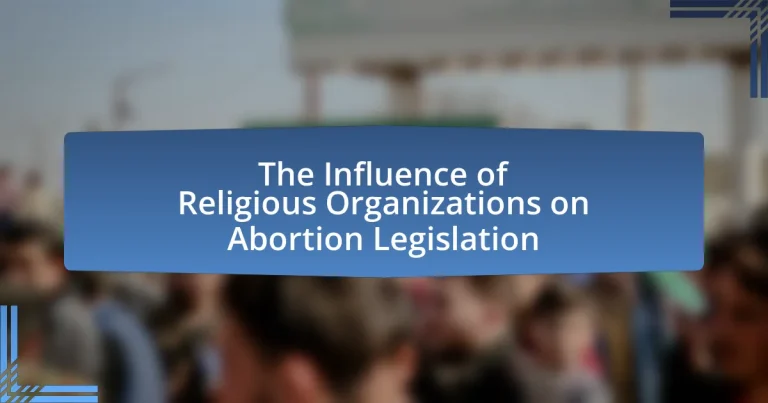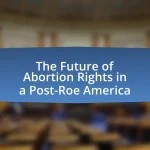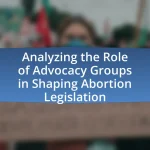The article examines the significant influence of religious organizations on abortion legislation, highlighting how these groups advocate for policies that reflect their moral and ethical beliefs. It discusses the role of religious beliefs in shaping public opinion, the interpretation of religious texts regarding abortion, and the historical context of the pro-life movement in the United States. Key religious organizations, such as the Catholic Church and various evangelical groups, are identified as major players in lobbying efforts and political advocacy, which have led to the enactment of restrictive abortion laws. The article also explores the implications of religiously motivated legislation on women’s rights, public health outcomes, and societal divisions, while suggesting strategies for navigating the influence of religious organizations in the legislative process.
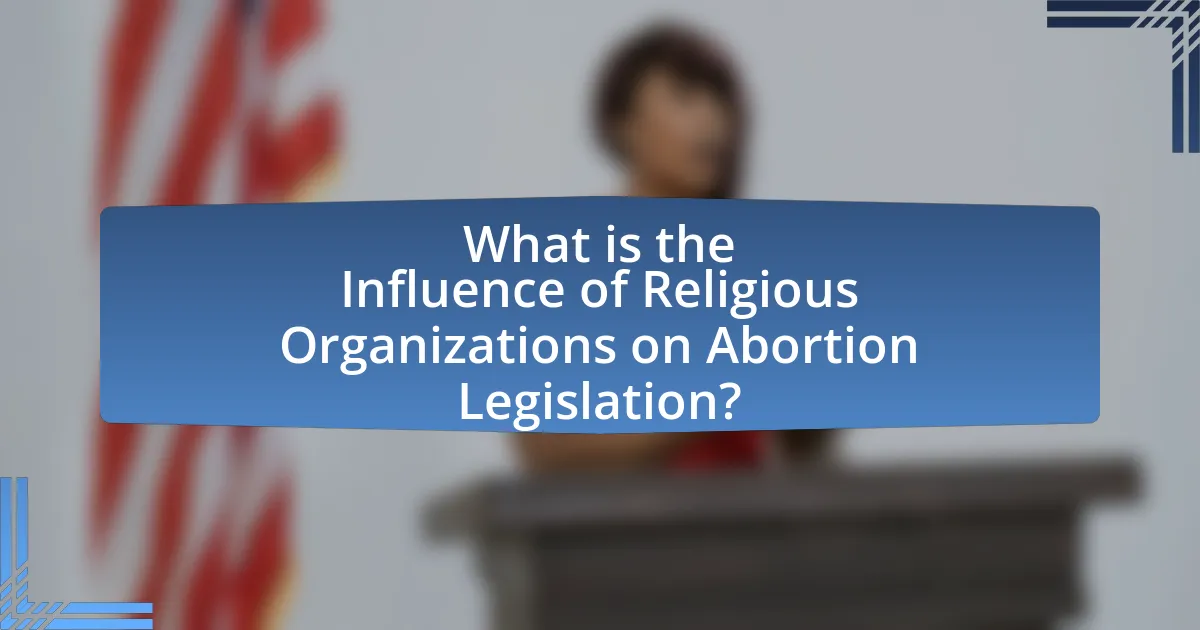
What is the Influence of Religious Organizations on Abortion Legislation?
Religious organizations significantly influence abortion legislation by advocating for policies that align with their moral and ethical beliefs. These organizations often mobilize their congregations, lobby lawmakers, and engage in public campaigns to promote anti-abortion laws. For instance, the Catholic Church and various evangelical groups have historically played pivotal roles in shaping legislation, such as the Hyde Amendment, which restricts federal funding for abortions. Research indicates that states with higher levels of religious affiliation tend to enact more restrictive abortion laws, demonstrating a direct correlation between religious influence and legislative outcomes.
How do religious beliefs shape public opinion on abortion?
Religious beliefs significantly shape public opinion on abortion by influencing moral perspectives and ethical considerations surrounding the issue. For instance, many religious groups, particularly within Christianity, Islam, and Judaism, advocate for the sanctity of life, leading their followers to oppose abortion on moral grounds. According to a Pew Research Center study, 61% of white evangelical Protestants believe that abortion should be illegal in most or all cases, reflecting how religious doctrine informs their views. Additionally, religious organizations often mobilize their congregations to engage in political activism, further solidifying these beliefs within the broader public discourse. This mobilization can lead to increased support for anti-abortion legislation and influence policymakers, demonstrating the direct impact of religious beliefs on public opinion and legislative outcomes regarding abortion.
What role do religious texts play in forming views on abortion?
Religious texts significantly shape views on abortion by providing moral and ethical frameworks that followers interpret and apply to the issue. For instance, many religious traditions cite specific passages that emphasize the sanctity of life, influencing adherents to oppose abortion. In Christianity, verses such as Psalm 139:13-16, which speaks of God’s role in forming life, are often referenced to argue against abortion. Similarly, Islamic teachings, including those found in the Hadith, emphasize the value of life and the belief that life begins at conception, leading many Muslims to adopt a pro-life stance. These interpretations of religious texts create a foundation for the beliefs and actions of religious organizations, which in turn advocate for specific abortion legislation aligned with their doctrines.
How do different faiths interpret the morality of abortion?
Different faiths interpret the morality of abortion in varied ways, often influenced by their theological teachings and ethical frameworks. For instance, the Roman Catholic Church views abortion as morally unacceptable, asserting that life begins at conception and that terminating a pregnancy is equivalent to taking a human life. This stance is rooted in the belief that all human life is sacred, as articulated in the Catechism of the Catholic Church.
In contrast, many Protestant denominations hold a range of views on abortion. Some, like the United Methodist Church, support a woman’s right to choose, emphasizing the importance of individual conscience and the complexities surrounding each situation. This perspective is often informed by a belief in God’s grace and the moral agency of individuals.
Judaism generally permits abortion under certain circumstances, particularly when the mother’s life or health is at risk. The Talmudic teachings prioritize the mother’s well-being, reflecting a nuanced understanding of the moral implications of abortion.
Islam also presents a diverse interpretation, with many scholars allowing abortion within the first 120 days of pregnancy, particularly if there are concerns for the mother’s health or fetal abnormalities. This is based on interpretations of the Quran and Hadith that emphasize the sanctity of life while also considering the mother’s circumstances.
These differing interpretations highlight how religious beliefs shape moral perspectives on abortion, influencing both individual choices and broader legislative frameworks.
What historical context is important for understanding this influence?
The historical context important for understanding the influence of religious organizations on abortion legislation includes the rise of the pro-life movement in the United States during the late 20th century, particularly following the 1973 Supreme Court decision in Roe v. Wade, which legalized abortion nationwide. This decision galvanized various religious groups, especially conservative Christian denominations, to mobilize against abortion, framing it as a moral and ethical issue. The subsequent formation of organizations such as the National Right to Life Committee and the involvement of the Catholic Church and evangelical groups in political advocacy significantly shaped public opinion and legislative efforts. These organizations utilized grassroots campaigns, lobbying, and alliances with political entities to promote restrictive abortion laws, reflecting their religious beliefs and values in the legal framework.
How have religious organizations historically engaged in political advocacy regarding abortion?
Religious organizations have historically engaged in political advocacy regarding abortion primarily by mobilizing their congregations, influencing public opinion, and lobbying lawmakers to enact restrictive abortion laws. For instance, in the United States, the Catholic Church has been a prominent advocate against abortion since the 19th century, actively participating in campaigns to criminalize the procedure and promote pro-life legislation. Additionally, evangelical Protestant groups gained significant traction in the late 20th century, particularly after the Roe v. Wade decision in 1973, leading to the formation of coalitions like the National Right to Life Committee, which has worked to shape legislation and public policy against abortion. These organizations often utilize grassroots efforts, such as rallies and educational campaigns, to galvanize support and exert pressure on political leaders, demonstrating their sustained influence on abortion legislation throughout history.
What key events have marked the relationship between religion and abortion legislation?
Key events that have marked the relationship between religion and abortion legislation include the 1973 U.S. Supreme Court decision in Roe v. Wade, which legalized abortion nationwide and prompted significant religious opposition, particularly from Catholic and evangelical groups. This opposition led to the formation of various pro-life organizations, such as the National Right to Life Committee, which mobilized religious communities to advocate for restrictive abortion laws. Additionally, the 1980s saw the rise of the Religious Right, which further intertwined religious beliefs with political action against abortion, culminating in legislative efforts like the Hyde Amendment of 1976, which restricted federal funding for abortions. These events illustrate how religious organizations have actively influenced abortion legislation through advocacy, legal challenges, and political mobilization.
What are the main religious organizations involved in abortion legislation?
The main religious organizations involved in abortion legislation include the Roman Catholic Church, the Southern Baptist Convention, and various evangelical Christian groups. The Roman Catholic Church actively opposes abortion, advocating for pro-life policies and influencing legislation through its extensive network of clergy and lay organizations. The Southern Baptist Convention, representing a significant portion of the Protestant community, also takes a strong stance against abortion, promoting anti-abortion initiatives and lobbying efforts. Additionally, various evangelical Christian groups engage in activism and political lobbying to shape abortion laws in alignment with their beliefs. These organizations collectively exert considerable influence on public policy and legislative processes regarding abortion.
Which denominations are most active in anti-abortion advocacy?
The denominations most active in anti-abortion advocacy include the Roman Catholic Church, evangelical Protestant churches, and certain Orthodox Christian groups. The Roman Catholic Church has a long-standing position against abortion, emphasizing the sanctity of life from conception, which is reflected in its teachings and public campaigns. Evangelical Protestant churches, particularly those aligned with the Southern Baptist Convention and other conservative groups, actively promote anti-abortion policies through various organizations and grassroots efforts. Additionally, some Orthodox Christian groups also advocate against abortion, aligning their beliefs with the traditional Christian view of the sanctity of life. These denominations collectively influence public opinion and legislation regarding abortion through their advocacy efforts and community outreach.
How do interfaith coalitions impact abortion legislation efforts?
Interfaith coalitions significantly impact abortion legislation efforts by uniting diverse religious perspectives to advocate for specific policies. These coalitions leverage their collective moral authority and community influence to shape public opinion and legislative agendas. For instance, the Religious Coalition for Reproductive Choice, which includes various faith traditions, actively campaigns for reproductive rights, emphasizing that many religious groups support access to abortion. This collaborative approach can lead to increased visibility and support for legislation that aligns with their shared values, ultimately affecting the outcomes of legislative processes.
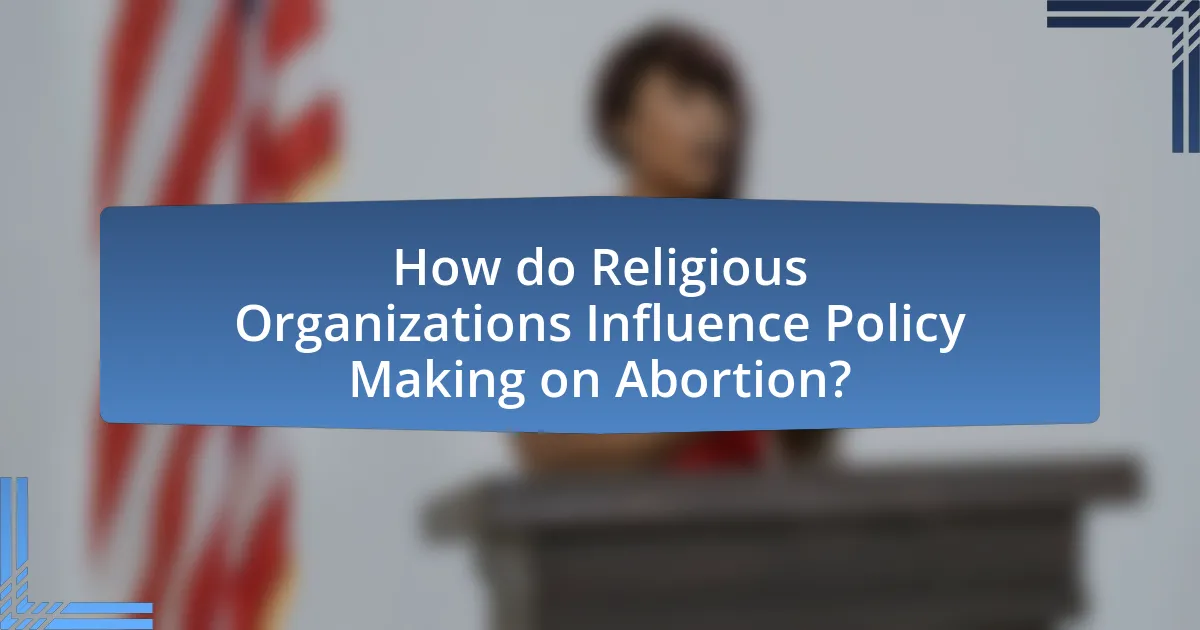
How do Religious Organizations Influence Policy Making on Abortion?
Religious organizations influence policy making on abortion primarily through advocacy, lobbying, and mobilizing their congregations. These organizations often leverage their moral authority and community networks to shape public opinion and political agendas. For instance, groups like the Catholic Church and various evangelical organizations actively campaign against abortion rights, using resources to fund political candidates who align with their anti-abortion stance. According to a 2020 study by the Pew Research Center, 61% of Americans who attend religious services regularly oppose abortion, demonstrating how religious beliefs can translate into political pressure. Additionally, religious organizations often participate in legislative processes by providing testimony, drafting model legislation, and forming coalitions to amplify their influence on lawmakers.
What strategies do religious organizations use to influence lawmakers?
Religious organizations influence lawmakers through lobbying, grassroots mobilization, and coalition-building. Lobbying involves direct engagement with legislators to advocate for specific policies, often employing trained lobbyists who communicate the organization’s stance on issues like abortion. Grassroots mobilization includes rallying congregants and community members to contact their representatives, thereby demonstrating public support or opposition to legislation. Coalition-building allows religious groups to partner with other organizations, amplifying their voice and resources to create a united front on issues such as abortion. For instance, the National Right to Life Committee has effectively mobilized supporters to influence anti-abortion legislation across various states.
How do lobbying efforts by religious groups affect legislative outcomes?
Lobbying efforts by religious groups significantly influence legislative outcomes by shaping public opinion and directly engaging with policymakers. These groups often mobilize their congregations to advocate for specific policies, such as restrictions on abortion, which can lead to increased political pressure on legislators. For instance, the National Right to Life Committee, a prominent anti-abortion organization, has successfully lobbied for various state-level abortion restrictions, demonstrating the tangible impact of religious lobbying on legislative processes. Additionally, studies show that states with higher levels of religious lobbying tend to enact more restrictive abortion laws, indicating a correlation between religious advocacy and legislative action.
What role does grassroots mobilization play in shaping abortion laws?
Grassroots mobilization plays a crucial role in shaping abortion laws by organizing community efforts that influence public opinion and legislative action. Through campaigns, protests, and advocacy, grassroots movements can effectively raise awareness about abortion issues, mobilize voters, and apply pressure on lawmakers. For instance, the Women’s March and various local initiatives have successfully highlighted the importance of reproductive rights, leading to legislative changes in several states. Research indicates that states with active grassroots organizations advocating for abortion rights often see more progressive laws enacted, demonstrating the direct impact of community engagement on policy outcomes.
How do religious organizations collaborate with political entities?
Religious organizations collaborate with political entities primarily through advocacy, lobbying, and coalition-building to influence legislation, including abortion laws. For instance, groups like the Catholic Church and various evangelical organizations actively engage in political campaigns, mobilizing their congregations to support candidates who align with their values on issues such as abortion. They often provide resources, such as research and moral arguments, to lawmakers, thereby shaping public policy. A notable example is the role of the National Right to Life Committee, which has been instrumental in promoting anti-abortion legislation at both state and federal levels, demonstrating the effective partnership between religious groups and political actors in legislative processes.
What partnerships exist between religious groups and political parties?
Partnerships between religious groups and political parties often manifest in collaborative efforts to influence legislation, particularly on issues like abortion. For instance, in the United States, the Republican Party has historically aligned with evangelical Christian organizations to promote anti-abortion policies, leveraging shared values to mobilize voters. This partnership is evident in the formation of coalitions such as the Faith and Freedom Coalition, which actively campaigns for candidates who support restrictive abortion laws. Additionally, Catholic organizations, such as the United States Conference of Catholic Bishops, have partnered with both major political parties at various times to advocate for pro-life legislation, demonstrating the significant role religious groups play in shaping political agendas.
How do religious organizations leverage their networks to influence policy?
Religious organizations leverage their networks to influence policy by mobilizing their congregations, utilizing advocacy groups, and forming coalitions with like-minded entities. These organizations often engage in grassroots campaigns, encouraging members to contact legislators, participate in rallies, and vote in alignment with their beliefs. For instance, the National Right to Life Committee, a prominent anti-abortion organization, coordinates efforts among various religious groups to promote legislation that restricts abortion access. Additionally, religious organizations often provide resources and training for effective lobbying, which enhances their ability to shape public policy. This strategic use of networks has been shown to significantly impact legislative outcomes, as evidenced by the passage of numerous state-level abortion restrictions influenced by coordinated religious advocacy efforts.
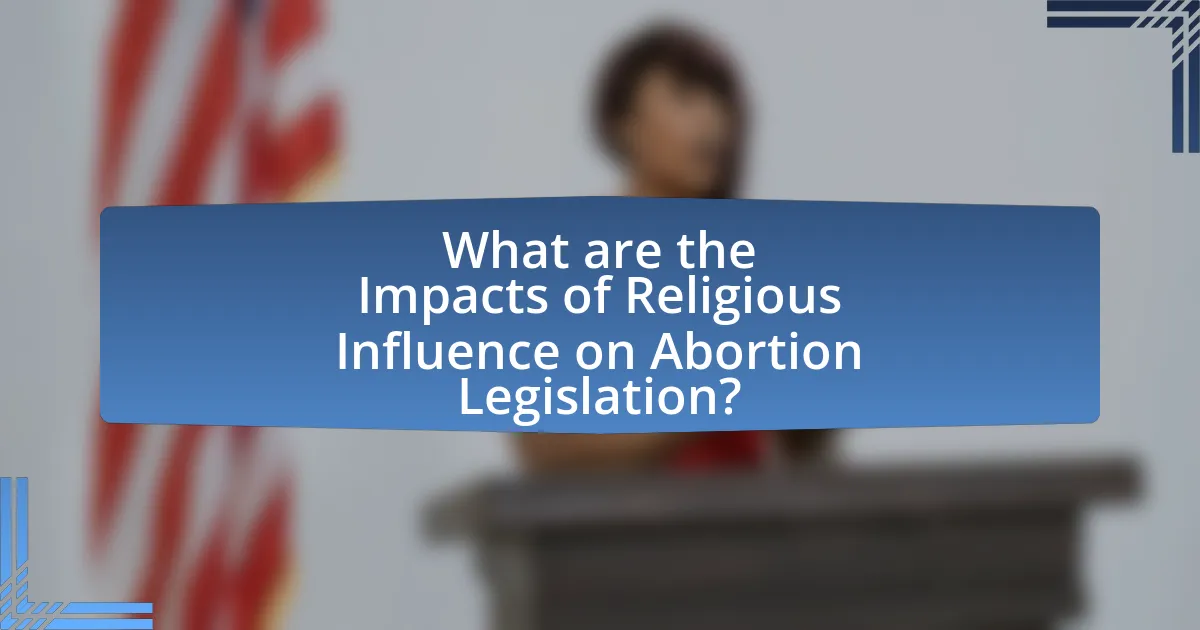
What are the Impacts of Religious Influence on Abortion Legislation?
Religious influence significantly impacts abortion legislation by shaping public opinion and political agendas. For instance, in the United States, various religious groups advocate for restrictive abortion laws based on their doctrinal beliefs, which has led to the enactment of laws such as the Texas Heartbeat Act, banning abortions after six weeks. Research indicates that states with higher levels of religious adherence often have more stringent abortion regulations, reflecting the moral perspectives of influential religious organizations. Additionally, lobbying efforts by groups like the Catholic Church and evangelical organizations have resulted in legislative changes that align with their anti-abortion stance, demonstrating a direct correlation between religious advocacy and the legal landscape surrounding abortion.
How does religious influence affect the legal landscape of abortion?
Religious influence significantly shapes the legal landscape of abortion by informing public opinion and legislative agendas. Various religious organizations advocate for restrictive abortion laws based on doctrinal beliefs, which can lead to the enactment of laws that limit access to abortion services. For instance, in the United States, the Catholic Church and evangelical groups have been pivotal in promoting anti-abortion legislation, resulting in numerous state-level restrictions and the overturning of Roe v. Wade in 2022. This shift illustrates how religious beliefs can translate into legal frameworks that affect reproductive rights, demonstrating the direct impact of religious influence on abortion legislation.
What are the implications of religiously motivated laws on women’s rights?
Religiously motivated laws often restrict women’s rights by imposing limitations on reproductive health choices, including access to abortion. For instance, in countries where religious doctrines heavily influence legislation, such as in some Islamic and Catholic-majority nations, laws may prohibit abortion entirely or allow it only under stringent conditions. This can lead to increased health risks for women, as they may resort to unsafe procedures when legal options are unavailable. According to the World Health Organization, unsafe abortions contribute to approximately 47,000 maternal deaths annually, highlighting the direct impact of restrictive laws on women’s health and rights. Furthermore, these laws can perpetuate gender inequality by reinforcing traditional gender roles and limiting women’s autonomy over their bodies and reproductive decisions.
How do religious beliefs impact access to abortion services?
Religious beliefs significantly impact access to abortion services by shaping public opinion, influencing legislation, and affecting healthcare providers’ practices. For instance, in countries where predominant religions oppose abortion, such as Catholicism in many Latin American nations, restrictive laws are often enacted, limiting access to these services. Additionally, religious organizations may lobby against abortion rights, leading to the implementation of policies that create barriers, such as mandatory waiting periods or counseling requirements. Research indicates that in the United States, states with higher levels of religious conservatism tend to have more restrictive abortion laws, which directly correlates with reduced access to abortion services.
What are the social consequences of religious influence on abortion legislation?
The social consequences of religious influence on abortion legislation include increased polarization within communities and the marginalization of women’s rights. Religious organizations often advocate for restrictive abortion laws based on moral beliefs, which can lead to societal divisions between those who support reproductive rights and those who oppose them. For instance, in the United States, states with strong religious lobbying have enacted laws that significantly limit access to abortion services, resulting in public protests and heightened tensions among differing ideological groups. Additionally, these legislative changes can disproportionately affect low-income women and women of color, exacerbating existing social inequalities and limiting their access to healthcare.
How do religiously influenced laws affect public health outcomes?
Religiously influenced laws significantly impact public health outcomes by restricting access to reproductive health services, including abortion. For instance, in countries where religious doctrines shape legal frameworks, such as in many predominantly Catholic nations, stringent abortion laws lead to higher rates of unsafe abortions and maternal mortality. According to the World Health Organization, unsafe abortions contribute to approximately 47,000 maternal deaths annually, highlighting the direct correlation between restrictive laws and adverse health outcomes. Furthermore, research published in the American Journal of Public Health indicates that states in the U.S. with more restrictive abortion laws experience worse health outcomes for women, including increased rates of unintended pregnancies and associated health complications. Thus, the influence of religiously motivated legislation on public health is evident through its detrimental effects on access to safe reproductive health services.
What are the societal divisions created by differing religious views on abortion?
Differing religious views on abortion create significant societal divisions, primarily between pro-choice and pro-life factions. These divisions manifest in polarized public opinions, legislative battles, and social movements, often reflecting deeper ideological and moral beliefs. For instance, many conservative religious groups, such as certain Christian denominations, advocate for pro-life stances, arguing that life begins at conception and equating abortion with murder. Conversely, more liberal religious perspectives, including some Jewish and Unitarian Universalist beliefs, support pro-choice views, emphasizing bodily autonomy and the moral agency of individuals. This dichotomy leads to conflicts in policy-making, as seen in the varying abortion laws across states in the U.S., where states with strong religious pro-life advocacy often enact restrictive laws, while others with more secular or liberal religious influences maintain more permissive regulations. The societal impact is profound, contributing to ongoing debates about women’s rights, healthcare access, and the role of religion in public life.
What can be done to navigate the influence of religious organizations on abortion legislation?
To navigate the influence of religious organizations on abortion legislation, policymakers can implement secular frameworks that prioritize evidence-based health care and individual rights. This approach involves creating laws that are grounded in scientific research and public health data rather than religious doctrine. For instance, the Guttmacher Institute reports that access to comprehensive reproductive health services, including abortion, is essential for women’s health and autonomy. By focusing on empirical evidence and the separation of church and state, legislators can mitigate the impact of religious beliefs on public policy, ensuring that laws reflect the diverse views of the population rather than the specific doctrines of religious groups.
What strategies can advocates use to promote reproductive rights in a religious context?
Advocates can promote reproductive rights in a religious context by engaging in interfaith dialogue that emphasizes shared values of compassion and justice. This approach allows advocates to connect reproductive rights to broader religious principles, such as the sanctity of life and the importance of health and well-being. For instance, organizations like the Religious Coalition for Reproductive Choice work to align reproductive rights with faith-based teachings, demonstrating that many religious traditions support women’s autonomy and health. Additionally, advocates can leverage religious texts and teachings to highlight the moral imperative of supporting reproductive health, thereby reframing the conversation within a religious framework that resonates with believers. This strategy is effective as it fosters understanding and reduces polarization, ultimately leading to more inclusive discussions around reproductive rights within religious communities.
How can dialogue between religious and secular groups improve abortion legislation?
Dialogue between religious and secular groups can improve abortion legislation by fostering mutual understanding and collaboration on shared values. This interaction allows both sides to address concerns, clarify misconceptions, and work towards common ground, which can lead to more balanced and inclusive policies. For instance, studies have shown that when religious organizations engage in discussions with secular advocates, they can influence legislation by advocating for compassionate approaches that consider both moral beliefs and women’s rights. This collaborative effort can result in laws that reflect a broader spectrum of societal values, ultimately leading to more effective and accepted abortion legislation.
